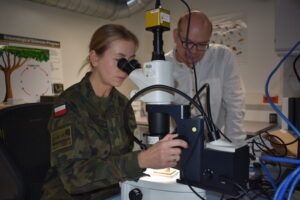
Public Health Command Europe
Dr. Fabian Haas, entomologist at Public health Command Europe, and a polish counterpart identifying mosquitos during the joint mosquito surveillance training at the PHCE Headquarters February 12 to 15.
Story by Michelle Thum
Public Health Command Europe
Public Health Command Europe’s Entomological Science Program invited the Polish Armed Forces for a joint mosquito surveillance training at the PHCE Headquarters February 12 to 15.
Four Polish officers from the Epidemiological Response Centre (ECR) attended the training which focused on tick and mosquito identification and covered mosquito biology and military history; medically important mosquitoes of Poland; trapping types and techniques; and developing a vector disease response plan.
The cooperation with the ERC of the Polish Armed Forces started in 2018 while preparing for a tick surveillance mission for Saber Strike, a U.S. Army Europe-led cooperative training event that is designed to enhance readiness and interoperability with allies and regional partners. Last year, Col. Paul Lang, PHCE commander, was able to tour the ERC in Warsaw, Poland.
“I’m excited to have you here to exchange knowledge and expertise. The Polish public health program is set up very different from ours which provides a great learning opportunity that encourages cross talk and unifies efforts for the American and Polish forces,” said Lang.
During the exercise, PHCE’s Entomological Science Program discussed the possibility of collaboration and assisting the ERC with setting up the first ever Polish military run mosquito surveillance program, which led to the development of this training event.
The ERC of the Polish Armed Forces is a specialized unit responsible for biological threat countermeasures and medical intelligence. It is part of the Military Medical Service Division under the Inspectorate of Branches of the Polish Armed Forces. The ERC comprises mobile and stationary elements, to include a mobile laboratory to conduct expeditionary field confirmation of biological threats.
“Events like these help us to sustain and fortify our partnership. On the preventive medicine side, speaking directly with our counterparts grants greater understanding of potential medical threats to service members out in the field,” said Capt. Michael Dunbar, entomologist at PHCE.
This collaboration builds PHCE’s interoperability with NATO allies and opens doors to future partnerships.
“The Polish military doesn’t have entomologists, but we still have to fulfill the role of entomologists which can be challenging. This training helped us significantly to dive deeper into the topics and build on the knowledge we already had,” said Maj. Aleksandra Sienko, veterinarian and chief of the ERC laboratory division. “We hope to strengthen this partnership over the next years to continue to train together and learn from each other.”
Moving forward, PHCE will continue to foster their relationship with their Polish counterparts and other allies and partners.